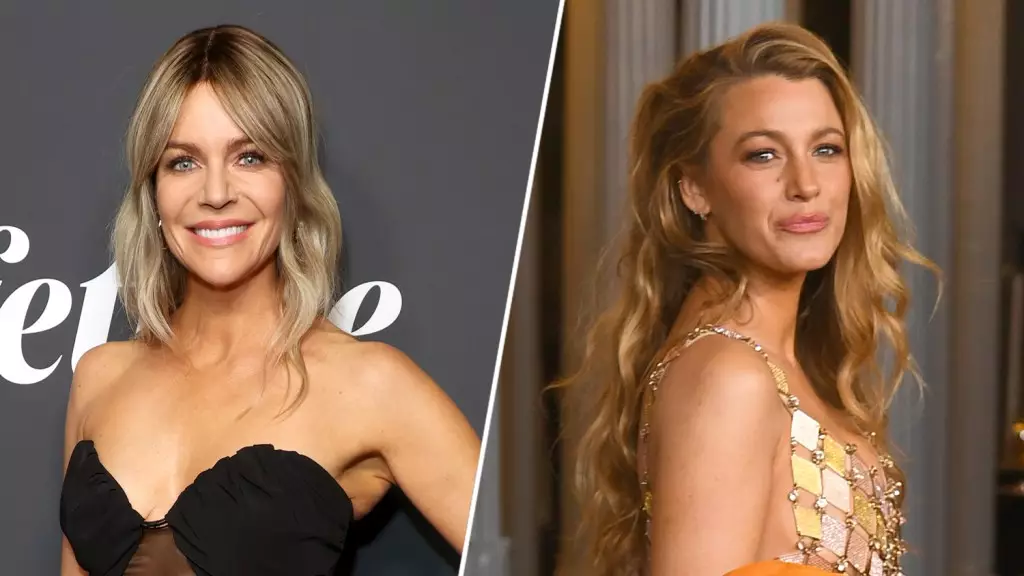In the entertainment industry, where fame and power often coexist, controversies can erupt with alarming speed and intensity. The recent tumult involving actress Blake Lively and director Justin Baldoni is a prime example of this dynamic. While it began as a seeming interpersonal conflict, the allegations against Baldoni have sparked a broader conversation about workplace ethics, support systems in Hollywood, and the mechanisms that protect or expose those accused of misconduct.
At the crux of this conflict are serious allegations made by Lively against Baldoni. She has accused him of sexual harassment and retaliatory actions that aimed to tarnish her reputation within the film industry. These claims gained traction following Lively’s public statement and her decision to file a detailed complaint with the California Civil Rights Department. This complaint elaborates on multiple instances of alleged misconduct, including a hostile work environment that purportedly jeopardized production of the film they were working on together.
Lively’s statements criticizing Baldoni extend beyond personal grievances; she claims that the actions taken against her fall within a larger pattern of retaliatory tactics common in environments where power dynamics can suppress the voices of those who dare to speak out. Her determination to shine a light on these issues reflects a growing awareness and refusal to remain silent in the face of misconduct within the industry.
In this challenging landscape, support from peers plays a crucial role in validating the experiences of those who come forward. Kaitlin Olson, an Emmy-nominated actress herself, expressed her backing for Lively by labeling her as “a kind, lovely, honest and generous person.” Olson’s public endorsement, shared via her Instagram Story, underscores the importance of solidarity among women in Hollywood who often face harassment and mistreatment.
Interestingly, Olson’s connections—her husband, Rob McElhenney, co-owns a football club with Lively’s spouse, Ryan Reynolds—add layers of complexity to the narrative. The intertwining relationships in Hollywood often complicate public support and render the stakes higher for individuals who decide to take a stand.
In stark contrast to Lively’s allegations, Baldoni has vehemently denied any wrongdoing. Through his legal representatives, he has labeled the claims “completely false” and hinted that the situation has been manipulated to paint an inaccurate portrait of his character. The contrasting narratives paint a picture of a deepening divide, as each party prepares to shore up their defenses for a potentially drawn-out legal battle.
The allegations against Baldoni are particularly concerning, as they suggest not merely individual misbehavior but an orchestrated effort to undermine those who speak out. The details of Lively’s complaint indicate that further scrutiny will fall on the practices of Baldoni’s production company, Wayfarer Studios, particularly regarding how it allegedly conducted a “sophisticated press and digital plan” to counteract the claims made against it.
As the legal dust settles, it appears that this case could set important precedents for how similar allegations are handled in the entertainment sector. Lively’s lawsuit is thorough, comprising 80 pages of claims and supporting evidence, including text messages that reportedly showcase a coordinated smear campaign. Meanwhile, Baldoni is preparing to file a counter-lawsuit, suggesting that he intends to shift the narrative and may argue that Lively’s actions are part of a broader tactic to distort the truth.
Notably, the stakes are not just about individual reputations, but also about the broader implications for Hollywood’s culture of silence surrounding misconduct. As highlighted by Baldoni’s attorney, the forthcoming litigation is poised to reveal what he describes as “real evidence” that would counter what they term a “demonstrably false narrative.” This rhetoric speaks to the larger questions of credibility, accountability, and the evolving standards that govern the behaviors of industry figures.
A Broader Implication
The ongoing conflict between Lively and Baldoni transcends personal allegations and touches on systemic issues that plague the entertainment industry. The manner in which allegations are handled, the support extended to those who come forward, and the overarching culture that informs responses to such claims all play vital roles in shaping the future of Hollywood’s ethical landscape. This case serves as a flashpoint, potentially igniting more dialogue around the importance of accountability and the protection of voices speaking out against misconduct.
As spectators watch this drama unfold, it remains to be seen how the outcomes will influence not only the lives of those directly involved but also the culture of the entire industry.
The unfolding events surrounding Blake Lively and Justin Baldoni illustrate not only personal conflict but also the urgent need for reform within Hollywood. The implications of these allegations are profound and may lead to substantial changes in practices, policies, and protections against workplace harassment in the future.
